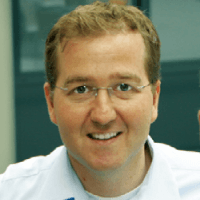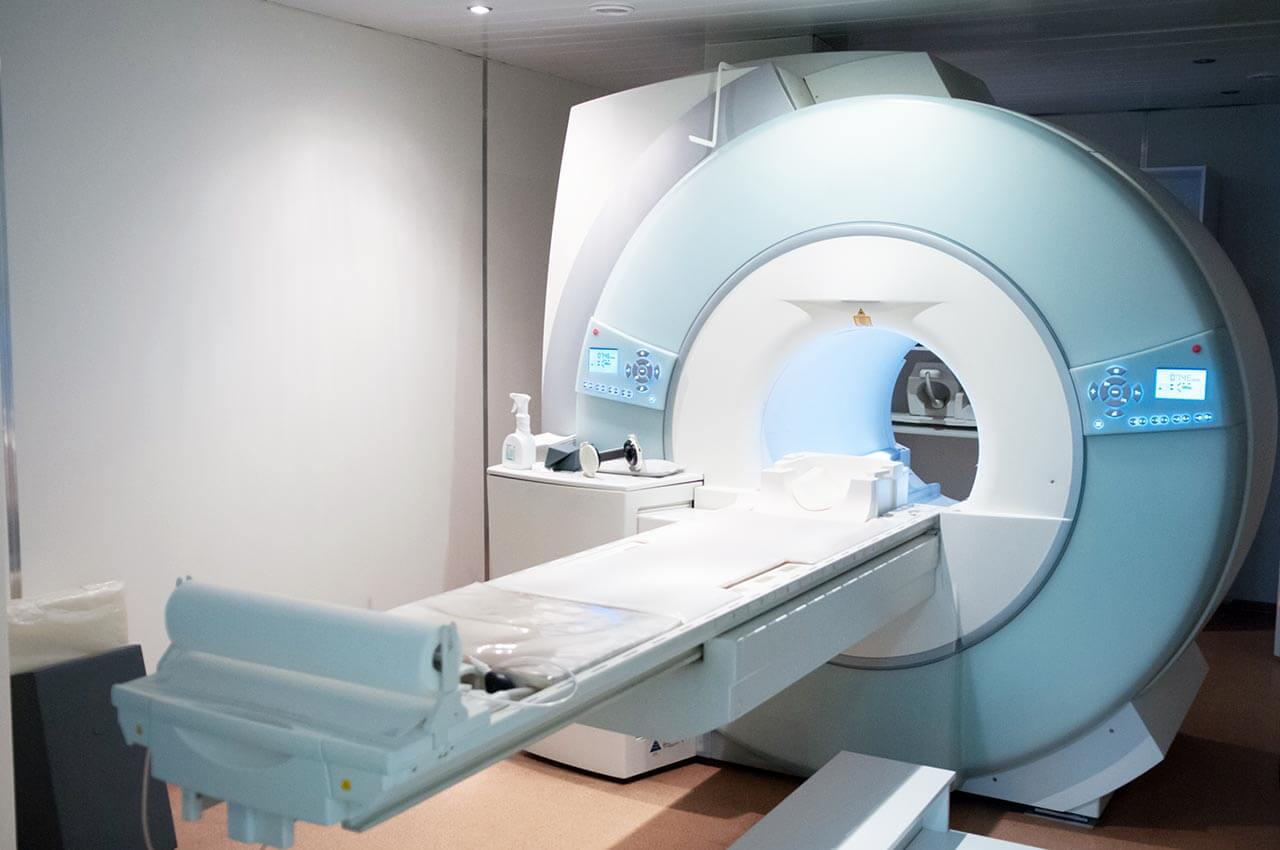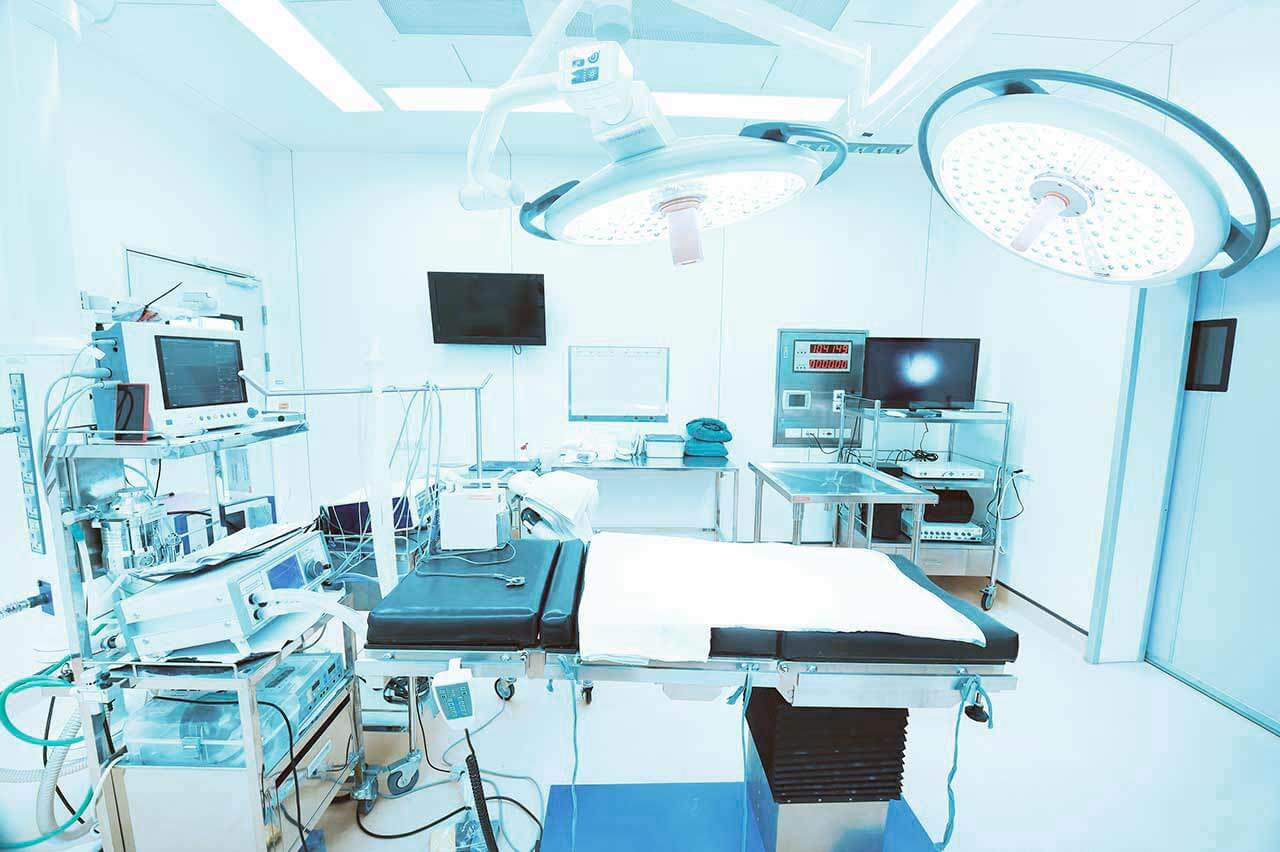
The program includes:
- Interview with doctor, medical history taking
- general clinical examination
- complete blood count
- extended blood test:
- thyroid function test (TSH, fT3, fT4)
- liver and pancreas function tests (ALT, AST, GGT,
AP, Bilirubin, CHE, LDH, Lipase) - kidney function test (creatinine, urea)
- mineral metabolism analysis (Na, K, Ca, Mg)
- lipid metabolism (HDL/LDL, cholesterol,
triglycerides Lip(a), homocysteine) - blood coagulation analysis (aPTT, PT, INR)
- metabolic status (uric acid, glucose)
- iron content (ferritin, iron)
- inflammatory markers (CRP, ESR)
- tumor markers (CEA, CA19-9, AFP, PSA)
- immunological status (protein electrophoresis)
- urinalysis (pH level, leukocytes, protein, ketones, erythrocytes)
- fecal occult blood test
- abdominal and pelvic ultrasound
- thyroid ultrasound
- whole-body MRI (or alternatively, a two-region MRI)
- gastroscopy (with the H.pylori test and biopsy)
- colonoscopy (with biopsy and polypectomy if clinically indicated)
- urological Check-Up:
- prostate ultrasound
- kidney and bladder ultrasound
- prostate and testicular transrectal examination
- interview and recommendations after examination
- written statement
Required documents
- Medical records (if availale)
Service
You may also book:
 BookingHealth Price from:
BookingHealth Price from:
About the department
The Department of Gastroenterology, Hepatology and Infectology at the University Hospital Tuebingen offers the full range of services for the diagnostics and treatment of pathologies of the digestive tract and liver, as well as infectious diseases. In the department, the patient is provided with the first-class medical care using the most advanced therapeutic techniques, individual care of highly qualified doctors and nurses. In addition, the department conducts active research activities aimed at the development of new treatment options for previously incurable pathologies. The department is headed by Prof. Dr. med. Nisar Malek.
The doctors have special competence in the treatment of liver and biliary tract, esophageal, intestinal and pancreatic cancer. In the course of treatment, the patients receive comprehensive consultations, an informative second opinion, a comprehensive examination, an individually developed step-by-step treatment plan. If desired, the patient can take part in the clinical trials of a medicinal product or treatment method, which saves lives in some cases.
The department has excellent options to perform various endoscopic procedures for the diagnostic and therapeutic purposes. For example, to diagnose the upper gastrointestinal tract, doctors conduct esophagogastroduodenoscopy, endosonography, chromoendoscopy, endomicroscopy, etc., while the therapeutic range in this field includes polypectomy, endoscopic submucosal dissection, dilation and bougienage in stenosis, closure of perforations and anastomotic defects, removal of foreign bodies and many other endoscopic procedures.
The main clinical activities of the department include:
- Diagnostics and treatment of diseases of the liver and bile ducts, including acute and chronic liver diseases, rare diseases of the liver and bile ducts
- All types of acute and chronic viral infections of the liver (for example, hepatitis B and hepatitis C)
- Non-alcoholic fatty liver disease
- Autoimmune diseases of the liver and biliary tract (for example, primary biliary cholangitis, primary sclerosing cholangitis and autoimmune hepatitis)
- Cholelithiasis
- Metabolic disorders of the liver (for example, hemochromatosis and Wilson's disease)
- Cirrhosis
- Patient care before and after liver transplantation
- Infectious diseases of the liver (for example, bacterial abscess of the liver and parasitosis)
- Diagnostics and treatment of the pancreatic diseases
- Diagnostics and treatment of stomach and esophageal diseases
- Diagnostics and treatment of bowel diseases
- Crohn's disease
- Ulcerative colitis
- Celiac disease
- Microscopic colitis
- Diagnostics and treatment of benign and malignant tumors of the liver and biliary tract, esophagus, intestines and pancreas
- Diagnostics and treatment of infectious diseases (special focus on the treatment of HIV infection)
- Diagnostics and treatment of other pathologies
Curriculum vitae
Professional Career
- 2015 - present Director, Center for Personalized Medicine (ZPM), University Hospital Tuebingen.
- 2013 - present Deputy Director, Comprehensive Cancer Center Tuebingen-Stuttgart.
- 2011 - present Full Professor and Director, Department of Gastroenterology, Hepatology and Infectiology, University Hospital Tuebingen.
- 2008 Professorship for Cell Proliferation Control within the Cluster of Excellence "REBIRTH", Hannover Medical School, Hannover.
- 2007 - 2011 Group Leader, Trans Med Lab, Helmholtz Centre for Infection Research, Braunschweig.
- 2007 Habilitation in Internal Medicine, Hannover Medical School, Hannover.
- 2002 - 2007 Group Leader, Institute for Molecular Biology, Hannover Medical School, Hannover.
- 1998 - 2001 Postdoctoral Fellow, Fred Hutchinson Cancer Research Center, Seattle, USA.
- 1996 Doctor of Medicine, Hannover Medical School, Hannover.
Scholarships, Awards and Administrative Functions
- 2015 - present Speaker, Research Committee of the German Society for Internal Medicine (DGIM).
- 2014 - present Member, Scientific Review Board of the German Cancer Aid (Deutsche Krebshilfe).
- 2012 - present Member, Scientific Advisory Board, Comprehensive Cancer Center Göttingen.
- 2012 - present Member, Board of Trustees, Fritz Lipman Institute for Aging Research, Jena.
- 2007 - present Speaker, early drug development/phase 1 group (AIO).
- 2009 Board Certification, Internal Medicine and Gastroenterology.
- 2009 Johann Georg Zimmermann Prize for Cancer Research.
- 2008 Scientific Award of the German Working Group on Oncology (AIO).
- 2006 Consultant, Department of Gastroenterology, Hepatology and Endocrinology, Hannover Medical School, Hannover.
- 2006 Board Certification, Internal Medicine.
Photo of the doctor: (c) Universitätsklinikum Tübingen
About hospital
According to the prestigious medical publication Focus, the University Hospital Tuebingen ranks among the top five German hospitals!
The hospital was founded in 1805, therefore it is proud of its long history, unique experience, and outstanding achievements in the field of medical care, as well as research and teaching activities. Nowadays, it is one of the most advanced medical institutions, which provides a wide range of general and highly specialized medical services. The hospital combines the state-of-art medical technologies in the field of diagnostics and the very latest treatment methods of a wide range of diseases.
The hospital has 17 specialized departments, which cover almost all fields of modern medicine and contribute to the top-class medical service in Germany. It treats about 367,000 outpatients and 74,000 inpatients annually. This testifies to the high authority of the hospital at the national and international medical arena. This is the first German hospital, which confirmed the high quality of healthcare and the effectiveness of service with a KTQ certification (in 2009).
Photo: (с) depositphotos
Accommodation in hospital
Patients rooms
The patients of the University Hospital Tuebingen live in comfortable single and double rooms with an ensuite bathroom equipped with a shower and toilet. The beds in the patient rooms are equipped with orthopedic mattresses that promote good and full sleep. There is a TV in the room, and it is also possible to connect a smartphone or laptop to the Internet. In addition, there is enough space in the patient room to receive 2-3 guests without inconvenience for the second patient.
The enhanced-comfort rooms include a hairdryer, heated towel rail, a large mirror, a direct dial telephone, a flat-screen satellite TV, a writing desk, free Internet access, a mini-bar and a refrigerator.
Meals and Menus
The patients of the hospital are offered tasty and healthy three meals a day: breakfast, lunch and dinner. Breakfast is served as a buffet, while for lunch and dinner there is a choice of several menus. Also, if desired, the patient will be provided with an individual menu. There are several cafes and cafeterias on the territory of the hospital, where one can have a tasty meal or enjoy a cup of coffee, tea and dessert.
Further details
Standard rooms include:
Religion
Religious services are available upon request.
Accompanying person
During the inpatient program, an accompanying person can stay with you in a patient room or in a hotel of your choice.
Hotel
During the outpatient program, you can stay in a hotel of your choice. Our managers will help you choose the most suitable option for you.




